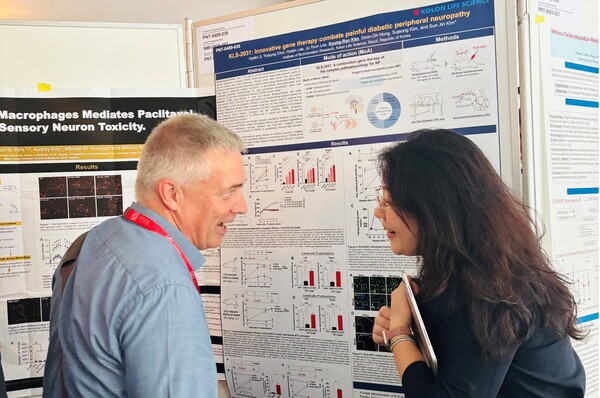Kolon Life Science announced on Wednesday that it presented preclinical research results for its gene therapy candidate, KLS-2031, in painful diabetic peripheral neuropathy (PDPN) at the international neuropathic pain conference, “NeuPSIG (Neuropathic Pain Special Interest Group) 2025,” held in Berlin, Germany, on Thursday of last week (local time).

The presentation revealed new data confirming that KLS-2031's pain-relieving effect was maintained even in PDPN animal models receiving insulin therapy.
Given that many PDPN patients continue to experience pain despite insulin treatment, these results demonstrate KLS-2031's potential to address the limitations of existing PDPN therapies, the company said.
The experiment was conducted in a rat model with diabetes induced by streptozotocin (STZ). A single dose of KLS-2031 resulted in significant, long-term pain relief regardless of insulin administration status. Considering PDPN is a chronic condition, achieving prolonged pain relief with a single KLS-2031 dose holds significant therapeutic strategy implications. The fact that KLS-2031 alleviated diabetic neuropathic pain symptoms without altering safety indicators like body weight or blood glucose further supports its potential as a treatment for intractable pain.
KLS-2031 administration also demonstrated excellent anti-inflammatory effects by regulating the immune cell environment within the dorsal root ganglion (DRG) and spinal cord, creating an immune environment similar to that of the control group. This demonstrates that KLS-2031 can act not only as an analgesic but also as a therapeutic agent that modulates the primary cause of pain.
KLS-2031 is a recombinant adeno-associated virus (rAAV)-based gene therapy designed to express the GAD65, GDNF, and IL-10 genes, which are crucial for suppressing neuroinflammation and regulating overexcited pain signaling pathways. It is expected to provide new value to both patients and the medical field as a once-in-a-lifetime treatment offering long-lasting effects in the PDPN field, where treatment options are limited.
“This presentation garnered significant interest from global pharmaceutical companies at the conference,” a company official said. “Following the presentation, we received requests for additional data and discussions regarding expanded indications, and we are actively continuing these discussions.”
Kolon Life Science CEO Kim Sun-jin remarked, “This research presents a new solution for patients whose pain remains unresolved despite existing treatments. We will continue to focus our R&D capabilities on developing patient-centered innovative therapies.”
NeuPSIG is an authoritative international academic conference in the field of neuropathic pain, providing a platform for researchers and clinicians worldwide to share the latest research and clinical findings.
Kolon Life Science announced plans to continue presenting research findings at various academic forums, including this conference, to expand its global research network.
Related articles
- Kolon Life Science secures Canadian patent for osteoarthritis cell-gene therapy
- Kolon Life Science wins Brazilian GMP approval for cholesterol-lowering API
- Kolon TissueGene moves arthritis gene therapy into spine trial after FDA green light
- Kolon Life Science turns profit in chemicals biz, eyes '2nd Invossa'
- Kolon Life Science wins EcoVadis Silver Medal in global ESG assessment
- [ESMO 2025] Kolon Life Science unveils promising oncolytic virus data
- Kolon Biotech earns 2025 Leisure-Friendly Management Certification for work-life innovation
- Kolon faces bio-business uncertainty as key developer weighs early exit

